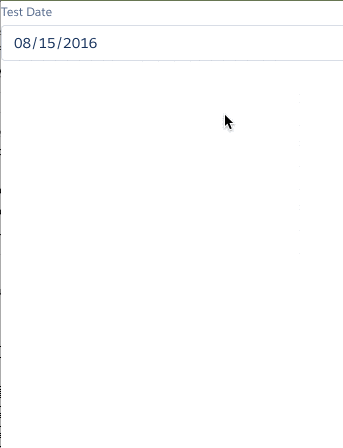UPDATE 2017-05-09 I've changed the component to remove ui:inputDate - beacuse of localization and other issues introduced by Salesforce. New components needed (and present here) are: DateTimeLib, InputDate, Select.
To build this component, I used several sources - however, as the result is kind of a mashup, I haven't included an licence information, as the code is all mixed up together. I used some of the structure of the existing Aura lightning component here. I also used some data structures and ideas from here.
UPDATE No more moment.js!! - It's uses the built in $A.LocalizationService object to do all date related tasks (which behind the scenes uses moment - but hey, I didn't load it!
Finally I was forced to use moment.js despite trying not to have any external dependencies, but due to a bug in the Lightning framework - I was forced to use it for string to date conversions.
Here's how to implement it:
Assuming you are using an Opportunity (obviously any object with a date would work), define the Opportunity as an attribute on your component:
<aura:attribute name="opportunity" type="Opportunity"
default="{ 'sobjectType': 'Opportunity',
'Name': 'New Opportunity',
'StageName': 'Some Stage' />
In your component, you need to handle the dateChangeEvent from the component:
<aura:handler name="dateChangeEvent" event="c:DateChange" action="{!c.handleDateChange}" />
In your form, put the below(once you have created it) as a top level member of the form:
<div class="slds-form-element slds-m-top--medium">
<c:DatePicker aura:id="closeDate" label="Close Date" placeholder="Enter a Date" value="{!v.opportunity.CloseDate}" formatSpecifier="MM/dd/yyyy" />
</div>
Finally, in your controller or helper update your date:
handleDateChange: function(cmp, event, helper) {
var dateSelector = event.getSource().getLocalId();
if (dateSelector == 'closeDate'){
var opp = cmp.get("v.opportunity");
opp.CloseDate = event.getParam("value");
}
}
How to use in a VF page - (once the component is built):
You will want a structure like this:
VF Page (instantiate and add callback)
DatepickerWrapper (handle date change events, call callback)
Datepicker (perform date display and selection)
In your DatepickerWrapper component, handle the dateChangeEvent from the Datepicker and add a callback attribute (for lightning out):
<aura:handler name="dateChangeEvent" event="c:DateChange" action="{!c.handleDateChange}" />
<aura:attribute name="callback" type="String" description="Call this to communicate results to visualforce page" access="global"/>
Place the Datepicker in the DatepickerWrapper component like this (assuming you are using slds) (you may want to do all form element stuff in the parent vf page - up to you):
<div class="slds-form-element slds-m-top--medium">
<c:DatePicker aura:id="closeDate" label="Close Date" placeholder="Enter a Date" value="{!v.opportunity.CloseDate}" formatSpecifier="MM/dd/yyyy" />
</div>
Instantiate the picker like this:
$Lightning.use("c:DatePickerApp", function() {
$Lightning.createComponent(
"c:DatePickerWrapper",
{value : {!Opportunity.CloseDate,
callback: function(){
alert('callback');
}
},
"lightning",
function(cmp) {});
});
Note the callback above - it's an attribute that will be called by the DatePickerWrapper class.
Finally, in your DatepickerWrapper controller or helper update your date by calling the callback on the vf page:
handleDateChange: function(cmp, event, helper) {
var func = cmp.get('v.callback');
if (func){
func({fieldName:"CloseDate",value:event.getParam("value")});
}
}
This is what it looks like:
Let me know if you find any bugs.
